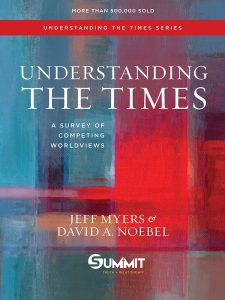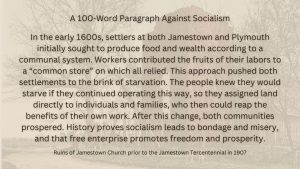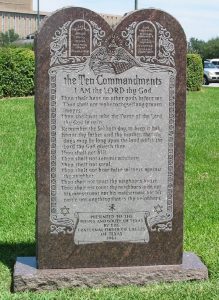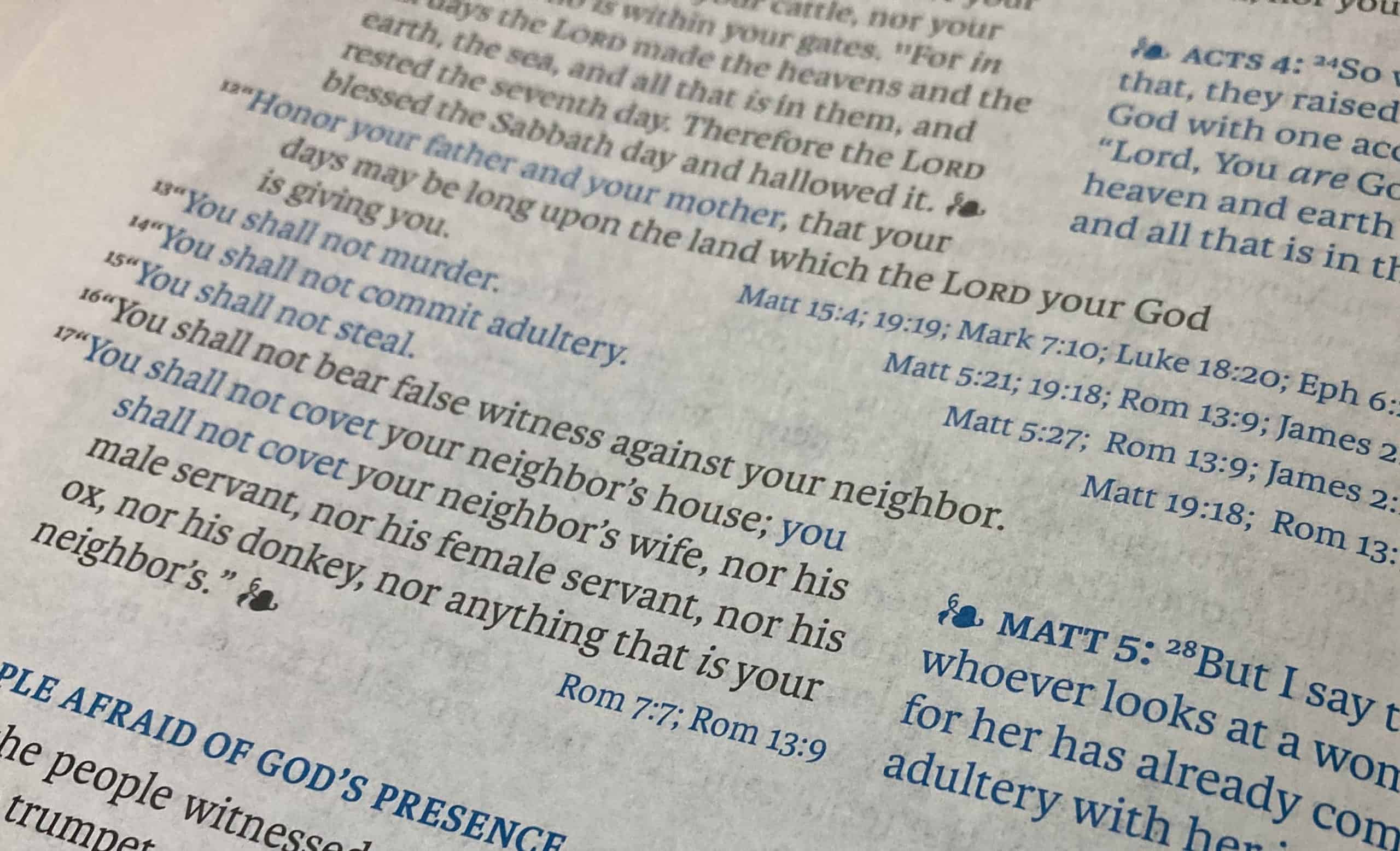Having ownership and control over tangible assets Is an expression of what it means to be human. Moreover, property rights also are essential to economic and personal freedom — types of freedom that also are at the heart of what it means to be human.
When it comes to defending God or the Bible or Jesus, there are a lot of great apologists, [b]ut in terms of apologists specifically addressing the political schemes of the left, and by name calling out people that have malicious designs for America, most apologists don’t have the fortitude to really get in the down and dirty fray of defending the country or the economic model that has been our M.O. for two centuries plus.…If you are a Christian, if you are a follower of Jesus, and I would say a thinking reflective Christian who’s willing to really sort through this, you really could not in good conscience advocate for socialism.
—Alex McFarland—
Where an excess of power prevails, property of no sort is duly respected. No man is safe in his opinions, his person, his faculties, or his possessions.
—James Madison—
Key point: No property rights, no freedom; know property rights, know freedom.

All of the articles in this series are accessible from this page.
In their excellent work titled Understanding the Times: A Survey of Competing Worldviews, authors Jeff Myers and David A. Noebel offer clear and concise definitions for both socialism and capitalism, or free enterprise.
 Socialism is “an economic system based upon governmental or communal ownership of the means of production and distribution of goods and services.”1
Socialism is “an economic system based upon governmental or communal ownership of the means of production and distribution of goods and services.”1- Capitalism or free enterprise is “an economic system in which capital assets are privately owned, and the prices, production, and distribution of goods and services are determined by competition within a free market.”2
With these definitions in mind, in October of 2022 I posted a 100-word paragraph against socialism at Word Foundations.
In the early 1600s, settlers at both Jamestown and Plymouth initially sought to produce food and wealth according to a communal system. Workers contributed the fruits of their labors to a “common store” on which all relied. This approach pushed both settlements to the brink of starvation. The people knew they would starve if they continued operating this way, so they assigned land directly to individuals and families, who then could reap the benefits of their own work. After this change, both communities prospered. History proves socialism leads to bondage and misery, and that free enterprise promotes freedom and prosperity.3

Despite socialism’s abysmal track record4 in both the distant and recent past, many Christians are deceived, or at best confused, about the Bible’s perspective on economic systems. Many young people, including a great many next-generation Christians, are captivated by rhetoric claiming that socialism is designed to help those who are oppressed and disadvantaged. Isn’t this consistent with biblical teachings? they wonder. (The social justice movement, with its ties to socialism and critical theory, offers similar perilous enticements.) Yet it is neither compassionate nor just for the government to take — steal — wealth from those who have worked hard to earn it and then give it to those who, for a variety of reasons, have less and are therefore deemed to be “in need.”
According to critical theory (CT), the “oppressed” (and therefore those in need) don’t even necessarily have less; they actually may have more but have been “oppressed” because they are black, female, and/or gay. Despite the reality that government is to be impartial and is to uphold justice as it’s been historically understood, CT calls on government to favor the “oppressed” groups we’ve just mentioned. This is inherently unjust.
What Does the Bible Say?
Among those who believe the Bible to be a true and reliable guidebook for individuals and even for nations, it is essential to determine if the Bible advocates, or even permits, socialism. Some Christians are convinced that the Bible does indeed teach socialism and even that Jesus Himself was a socialist (or at least that He advocated socialist principles). They further believe that the early church practiced socialism. Certain other Christians believe the Bible is neutral about economic systems and allows for socialism. In this four-part series, I’d like to dispel all of these ideas by examining twelve passages of Scripture that affirm the free enterprise market system and that therefore deal death blows to socialism.

I readily affirm that the Bible is not primarily a book of science, mathematics, philosophy, history, literature, economics, psychology, human relationships, or some other discipline we tend to view as mainly academic or intellectual. First and foremost, the Bible is a book of truth God has revealed about Himself, humanity, sin, good, evil, life, death, eternity, the spiritual realm, why human beings need Him, and how they can approach Him on His terms and have a relationship with Him. This is why we often call the Bible “God’s Word.” Yet Scripture doesn’t reveal truth about religious matters only. When it touches on any topic it addresses, it does so truthfully and reliably.
First and foremost, the Bible is a book of truth God has revealed about Himself, humanity, sin, good, evil, life, death, eternity, the spiritual realm, why human beings need Him, and how they can approach Him on His terms and have a relationship with Him. This is why we often call the Bible “God’s Word.”
Even if and when we discover biblical teachings that surprise us, we need to let the Bible speak for itself. This means we need to let God speak for Himself! Moreover, especially when we have questions, we need to seek answers and interpret the sacred text as objectively and fairly as possible, relying on
-
- God’s Spirit to guide us as well as
- the insights of well-informed and experienced Christians.

One more thing: We have to be wary of cultural trends that can heavily influence our posture toward the Scriptures as we read God’s Word today. Contemporary cultural winds are harsh toward Christianity and biblical values, and they influence many in today’s society to approach the Bible with their minds already made up against it. Yes, the Bible offends many, but this is because it is a book of truth, and the truth often is offensive. Jesus prayed to God, His Father, “Your word is truth.” He also said, “[Y]ou shall know the truth, and the truth shall make you free.”
In the twelve passages we will examine, we will see the whole of biblical teaching, not just isolated portions of Scripture that some might nefariously use to promote agendas that aren’t biblical at all. In other words, while we will examine twelve passages directly and mine from them the principles they teach, we also will cite a great many additional related passages that affirm the same principles and truths.
Private Property Rights: The Core Issue
Before we begin, it’s important to understand that in the definitions of socialism and free enterprise we’ve cited already, the critical difference between these systems relates to how each one addresses production and allocation of goods and services — in other words, property. In the reproduced definitions that follow, emphases have been added.
- Socialism is “an economic system based upon governmental or communal ownership of the means of production and distribution of goods and services.”1
- Capitalism or free enterprise is “an economic system in which capital assets are privately owned, and the prices, production, and distribution of goods and services are determined by competition within a free market.”2
The core difference between socialism and free enterprise is found in the former’s denial versus the latter’s affirmation of private property rights.
Therefore, the matter of property rights is a linchpin issue. The core difference between socialism and free enterprise is found in the former’s denial versus the latter’s affirmation of private property rights. Socialism cannot exist in a society that recognizes and affirms private property rights — the rights to personally and privately own and control finances and other tangible assets. Conversely, a free market economy cannot exist among a people who reject and deny these rights.5 Remember this takeaway: You tell me what you believe about private property rights, and I’ll tell you whether you tend to favor socialism or a free market economy. The more you disparage private property rights, the more you favor socialism; the more you promote those rights, the more you favor free enterprise.

The Ten Commandments: A List of Moral and Ethical Regulations — And Inherent Rights
Against the backdrop of all the information highlighted above, let’s consider these passages of Scripture.
First, Exodus 20:15, the Eighth of the Ten Commandments, declares, “You shall not steal.” This is a clear affirmation of the right of personal ownership of wealth and other tangible assets. Stealing occurs when someone takes something belonging to another. Were personal ownership not a reality, stealing could not occur.
Second, Exodus 20:17 directs, “You shall not covet your neighbor’s house; you shall not covet your neighbor’s wife, nor his male servant, nor his female servant, nor his ox, nor his donkey, nor anything that is your neighbor’s.”
This verse contains no less than seven possessive nouns and pronouns referring to one’s neighbor — and in each case the one used indicates personal and private ownership! Indentured servanthood was permitted in ancient Israel; but it was not the kind of slavery we think of today. Slavery was regulated in the Old Testament and acknowledged as a reality in the New Testament. Even though Scripture does not condemn slavery directly, consistent application of biblical principles has led to its demise in country after country where Christianity has taken hold.
Property rights are not merely to be tolerated, but also respected and honored.
The primary point here, however, isn’t about slavery. It’s that God’s law did and does forbid coveting anything belonging to another. To covet is to intensely desire someone or something belonging to someone else.6 Therefore, property rights are not merely to be tolerated, but also respected and honored.

The Eighth and Tenth Commandments uphold private property rights, not only as legitimate, but also as inherent, God-given rights. Just as
-
- the right to worship God according to His instructions,
- the right to rest periodically from work and the right to engage in regular, ongoing work,
- the right to be honored as a parent by one’s children,
- the right to life,
- the right to have one’s marriage recognized and respected by others, and
- the right to one’s reputation
are God-given, the rights to own and use one’s property as he sees fit also are God-given and inherent.
In fact, recognition of rights rooted in the Ten Commandments are essential to ordered liberty. Government has a duty to recognize and protect inherent rights. It does so by fulfilling its God-given task of maintaining order (see 1 Tim. 2:1-4) by commending those who do right and punishing those who do wrong (see Rom. 13:1-7; 1 Pet. 2:13-17). The right and wrong in these passages are those things that are “good” and “evil,” respectively, according to God’s standard of righteousness.7
More to Come
Next time we will explore another of the Ten Commandments as well as its corresponding rights and responsibilities. Both the rights and responsibilities involved have ties to private property and private property rights. We’ll also talk about the ways the Bible commends addressing the needs of the poor and disadvantaged.
Hang tight! We’re just getting started! I’ll post part 2 on or just before Independence Day, July 4.

Copyright © 2023 by B. Nathaniel Sullivan. All rights reserved.
- Part 1 of this series — this page:
Having ownership and control over tangible assets Is an expression of what it means to be human. Moreover, property rights also are essential to economic and personal freedom — types of freedom that also are at the heart of what it means to be human.
June 29, 2023
- Part 2 of this series is available here.
Who Has the Responsibility of Meeting the People’s Needs?
July 3, 2023 - Part 3 of this series is available here.
God’s Design Fosters Responsibility, Freedom, and Fulfillment
July 6, 2023 - Part 4 of this series is available here.
Work, Freedom, Rights, and Ethical Boundaries: Essential Elements of a Fair and Just Free Market
July 11, 2023
This article is available for publication and distribution by Exposing enemies within the church, LLC.
Unless otherwise indicated, Scripture has been taken from the New King James Version®. Copyright © 1982 by Thomas Nelson, Inc. Used by permission. All rights reserved.
top image credit: page 94 of the Reader’s Reference Bible: Two Testaments, One Word, NKJV (Nashville: Holman Bible Publishers, 2016),
Notes:
1Jeff Myers and David A. Noebel, Understanding the Times: A Survey of Competing Worldviews (Manitou Springs, Colorado / Colorado Springs, Colorado: Summit Ministries / David C. Cook, 2016), 100.
2Ibid.
3You can learn more about Jamestown here and Plymouth here.
4Also go here, here, here, here and here.
5Here’s what this means in practical terms. With socialism and its “governmental or communal ownership” of all resources, redistribution of resources inevitably will place — on an ongoing basis. If you “have at your disposal” more material goods than someone else, you don’t own them; the government does! The state will see to it that those in “need” will receive what you currently “have in excess.” Why? Because the state has deemed that they “need” it. It isn’t just socialism that advocates this, but also the social justice movement. While Wikipedia says, “Social justice is justice in terms of the distribution of wealth, opportunities, and privileges within a society,” Conservapedia more accurately states,
Social Justice, also known as economic justice, is a term describing the redistribution of wealth supposedly for the common good of all. However, this comes at the expense of wage earners and liberty by demanding a society to conform. Those who work and have must give to those who don’t work and don’t have. This is the fundamental basis of Marxism and championed by liberal progressives (emphasis added).
6Aspiring to work hard to acquire wealthy and material goods, however (as we will see in future posts), is commended in the Bible and therefore is different from coveting.
7Right and wrong are rooted in absolute truth, which is rooted in God’s holy character. In Isaiah 5:20-21 the inspired prophet declared,
Woe to those who call evil good, and good evil;
Who put darkness for light, and light for darkness;
Who put bitter for sweet, and sweet for bitter!
Woe to those who are wise in their own eyes,
And prudent in their own sight!

Be First to Comment